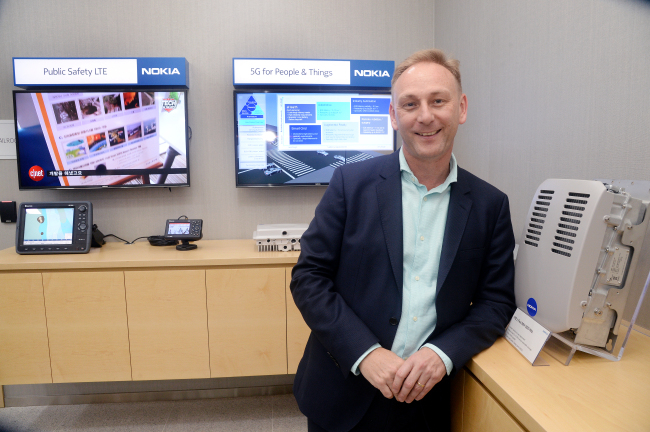[Eye Interview] ‘Korea will still be first in 5G’
Nokia Korea chief says 5G, IoT will make Korea a safer country
By Korea HeraldPublished : June 2, 2017 - 16:37
Believe it or not, South Korea’s mobile network industry, for the last three years, has been in limbo, with no additional money generated.
Andrew Cope, chief executive officer of Nokia Korea and a seasoned expert on the telecommunications industry with 16 years of experience, describes the Korean mobile market as “not easy.”
When he first came to Korea in late 2014, people didn’t recognize how fast their mobile services were. Korea had 200-megabit per second mobile packages that year, just a year after it launched a 100-megabit package, but Cope said no one appreciated the extra speed.
Andrew Cope, chief executive officer of Nokia Korea and a seasoned expert on the telecommunications industry with 16 years of experience, describes the Korean mobile market as “not easy.”
When he first came to Korea in late 2014, people didn’t recognize how fast their mobile services were. Korea had 200-megabit per second mobile packages that year, just a year after it launched a 100-megabit package, but Cope said no one appreciated the extra speed.

“The 200 one wasn’t noticed. No one really spent on the extra 100. That drove the whole industry into a no new money situation,” Cope said in an interview with The Korea Herald.
“But during the same period, traffic has more than doubled, that’s the cost. With no additional money coming in, the cost was going up.”
Now the Korean mobile industry is trying to change with less than a year ahead of commercialization of the fifth generation network, which has got global network builders like Nokia heavily engaged in the market.
“What we are doing here is to connect not just people to people, but people to content and people to the environment,” Cope said as he described the 5G network. “We have been putting a lot of efforts into Korea. Korea is on a path to lead the rest of the world in 5G.”
With the country’s three mobile operators SK Telecom, KT and LG Uplus, Nokia is working not just as a technical company but a service provider as well.
“With KT, we are looking at how to bring the technological change into services that will create more value for the people especially at the (PyeongChang 2018) Olympics,” he said.
Nokia, once the Finnish legendary brand for mobile phones, has long been providing its technologies for developments of mobile network infrastructure in Korea, and it is now approaching consumers with 5G and Internet of Things services.
“Korea and the US are neck-and-neck in terms of preparations for 5G. The US is very active on the horizon of 5G, but their use cases are limited to home IoT, whereas Korea is looking at the whole Olympics on what new services can it show and demonstrate,” Cope said. “And Japan is typically six months behind Korea, because they are more cautious.”
“I think Korea will still go first in 5G, because Korea’s spectrum regulations for 5G look favorable whereas the US still has unclear regulations. Korea has got a healthier attitude to risk. I expect KT, SKT and maybe LG Uplus will have some sort of launch in 2019,” he said.
Beyond providing network equipment and solutions for businesses, Nokia is currently expanding into the health, connected cars, security, public safety, smart city and energy sectors.
Cope showed special interest in the health sector, particularly. He wore a smart watch on his wrist on which Nokia is working together with IBM Watson to provide consumers with a wearable platform for monitoring their health.
As connectivity expands across more and more devices through the IoT network, Cope said security was getting enormously important.
“Security is currently underestimated. It is going to be one of the most important aspects when it comes to IoT,” he said. “We have a number of private and secure solutions looking at that monitors and detects unusual behaviors.”
As for the new Korean government, Cope had positive expectations for government support for the ICT industry.
“I think the new government will give no less support than the former government that was really pro ICT,” he said. “There are a number of things going on -- industry players are looking for ways to make money with 5G and IoT, health issues are getting more important as the population gets older and Korea had the Sewol ferry disaster that raised alarms for public safety -- all these are pointing to one direction, to ICT.”
In the next 10 years, Cope says technologies will no longer be an issue, but forecasts a huge societal change.
“There will be both winners and losers in the ICT society, for example, in the self-driving era, what will happen to all the taxi drivers? There will be more social issues than technical issues by then. So tech companies like us want to do it the right way.”
By Song Su-hyun (song@heraldcorp.com)
-
Articles by Korea Herald







![[Hello India] Hyundai Motor vows to boost 'clean mobility' in India](http://res.heraldm.com/phpwas/restmb_idxmake.php?idx=644&simg=/content/image/2024/04/25/20240425050672_0.jpg&u=)











